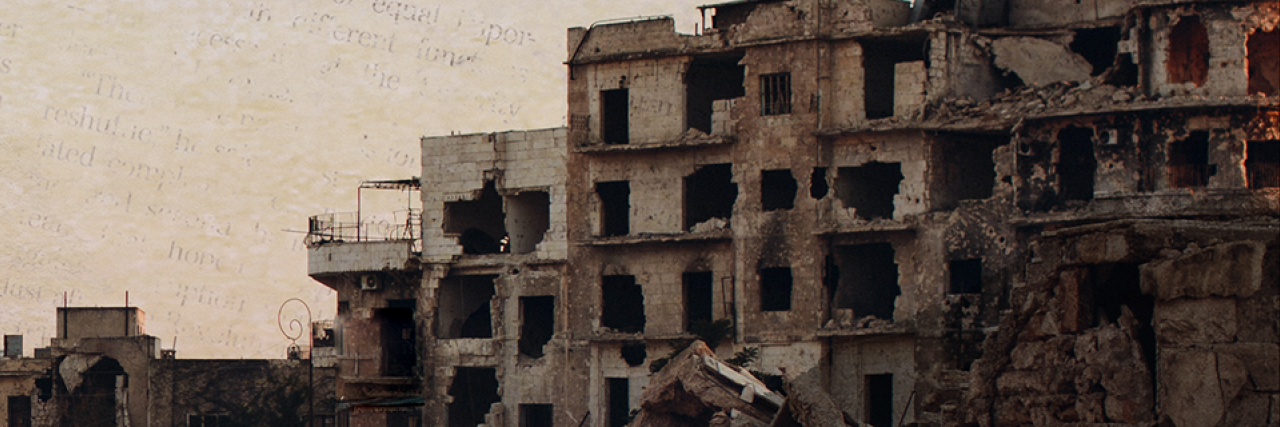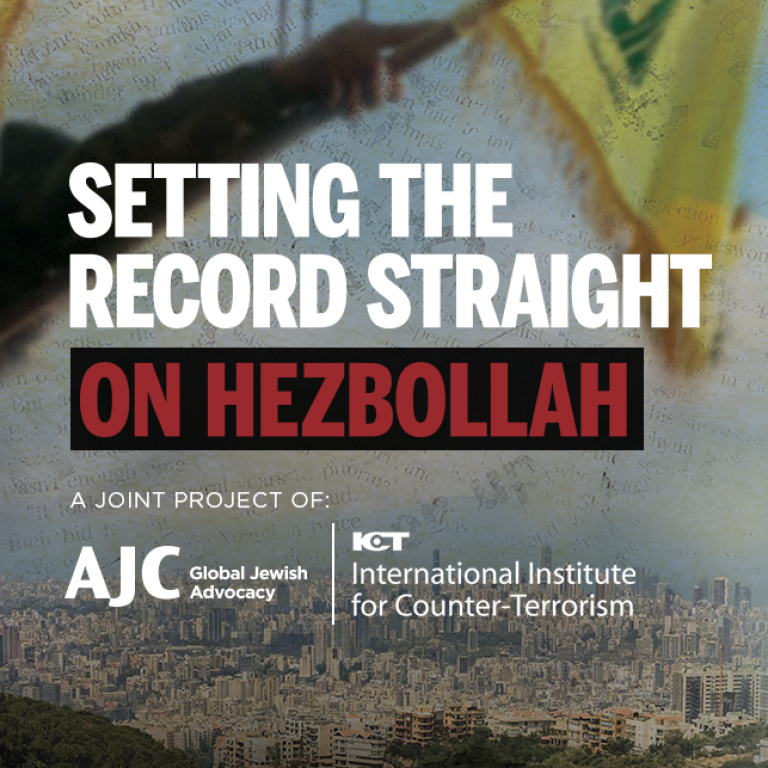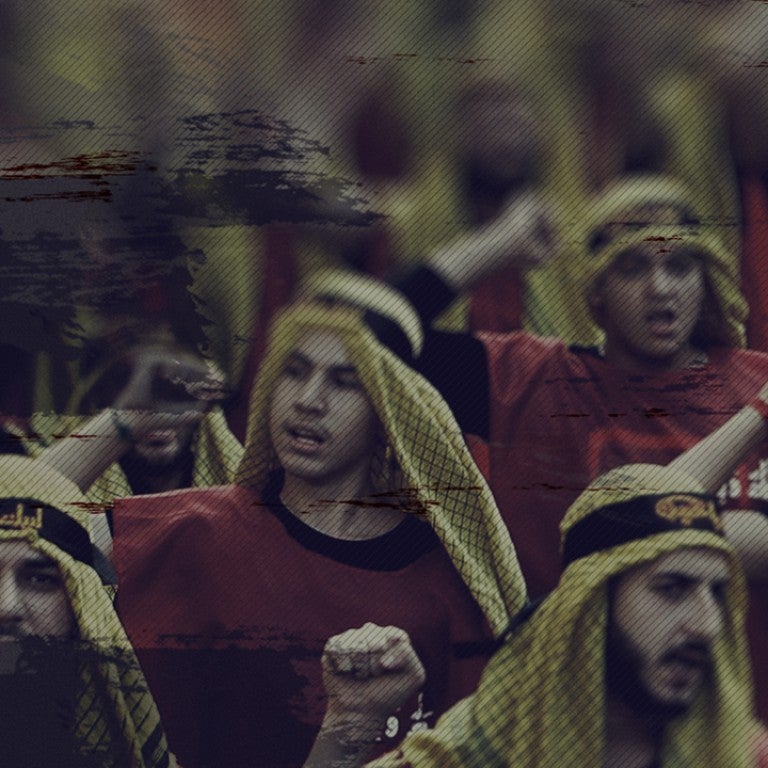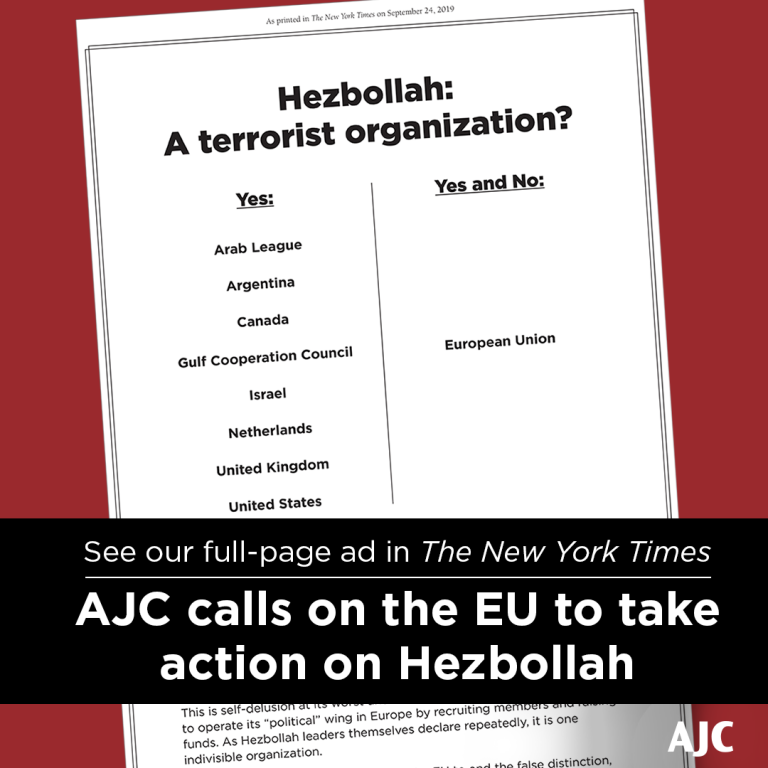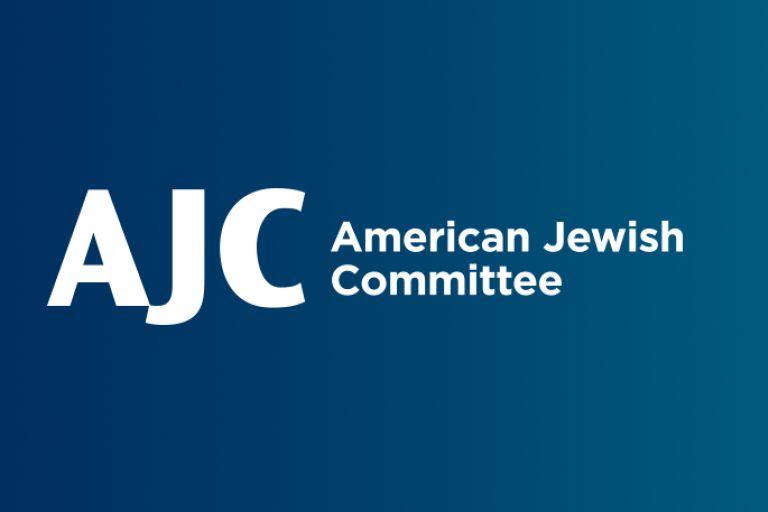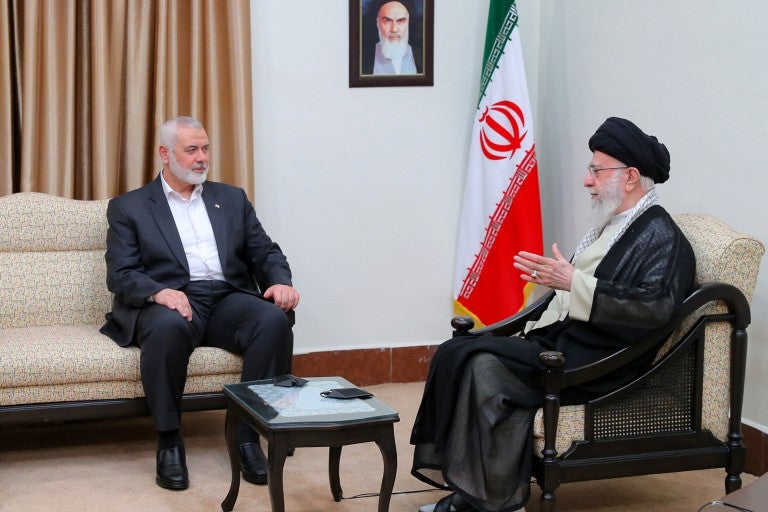“The complex nature of Hezbollah, including its presence in the Lebanese government and the social welfare it provides, makes full designation impossible.”
Short Response: Because Hezbollah has different wings that front for what it really is – a hybrid terrorist organization – only Hezbollah would object to full designation.
The Facts: Hezbollah is a hybrid terrorist organization that uses violent means and terrorism to advance its objectives and those of its main patrons: Iran and, to a lesser extent, Syria. The organization includes three wings: the civilian, armed terrorist, and political. They are indivisible and maintain a synergy that enables Hezbollah to present the outward appearance of a legitimate and pragmatic Lebanese party working to defend Lebanon.
However, in practice, Hezbollah's military wing, under the guidance of the organization's leaders, is involved in terrorist activities that result in the killing of civilians in Lebanon, the Middle East and around the world. The decision to only partially designate Hezbollah underscores the complex nature of the organization, but that complexity does not impede a full designation.
Key Details
To gain support, Hezbollah runs social welfare programs in Lebanon. In most cases, the political appointments requested or received by the organization serve some of its non-profit organizations: The Ministries of Industry and Agriculture overlap with Hezbollah's construction company, Jihad al-Bina. The Ministers of Labor and Industry intersect and work with the organization’s syndicate (workers' committees). The Ministries of Education and Sport do the same with Hezbollah’s educational institutions, and are responsible for kindergartens, schools and higher education, children and youth activities such as Imam Mahdi Scouts and youth soccer teams. The activities of the Ministry of Health overlap with the Islamic Health Authority, which operates hospitals, clinics and pharmacies, and the Foundation for the Wounded, which works to assist the organization’s injured. In addition, the role of Minister for Parliamentary Affairs affords the organization control over the cooperation between the Cabinet and Parliament.
Hezbollah's presence in government
- Hezbollah's representation in the parliament is relatively small in number but has a huge influence on Lebanese politics due to the existence of the military wing, which poses a threat to those who oppose Hezbollah. Hezbollah's main rival is the “March 14” Alliance, an umbrella organization that encompasses several political parties in Lebanon, including Al-Mustaqbal, or Future movement, and Prime Minister Saad Hariri’s party, which has lost a third of its power.
- According to the Lebanese constitution, a two-thirds majority of members of the government is required to make decisions. Data on the organization's involvement in the political system indicates that, over the years and in light of its increasing control over politics, Hezbollah has gained the ability to veto and thwart government decisions that are contrary to its interests.
Hezbollah as a hybrid terrorist organization
Hezbollah’s three wings (civilian, military, and political) maintain a synergy that enables the organization to present the outward appearance of a legitimate and pragmatic party working to defend Lebanon. However, in practice, the military wing, under the guidance of the organization's leaders, is involved in terrorist activities that result in the killing of civilians in Lebanon, the Middle East, and around the world. Since 2012, this activity has translated into Hezbollah's deep involvement in the Syrian civil war.
The 2012 terrorist attack in Burgas, Bulgaria, attempted strikes, and the establishment of terrorist infrastructure in Cyprus and Nigeria, the arrests of Hezbollah operatives in the U.S., and the involvement of its overseas terrorist unit (External Security Organization, ESO) in organized crime demonstrate that this is the group’s fixed organizational policy and strategy, whose purpose is to use violence to achieve its objectives and those of Iran.
Hezbollah doesn’t view itself as split in separate wings or factions. In fact, the opposite is true. On various occasions its leaders have stated unequivocally that Hezbollah is a hierarchical organization operating as a single entity under the control of the Shura Council (leadership council)-led by Hassan Nasrallah- in which every wing of the organization is represented. Its entry into politics did not moderate the organization, just as it did not moderate other Islamist players like the Iranians after the revolution.
How Hezbollah Views Itself
In 1992, Muhammad Fanish, a senior member of the organization and its representative in parliament at the time, stated: “Our entry into parliament is a form of resistance on the political level. This is because it is natural for members of the resistance to have a political crutch to stand behind them. This is because the armed resistance requires assistance in the political arena.”
In 2000, Naim Kassem, Nasrallah's deputy and a member of the Shura Council, summarized the nature and role of this Council. He claimed that “Hezbollah has a single leadership – the Shura Council that decides and manages all political, jihad, cultural, and social activities…the Secretary-General of Hezbollah is the head of the Shura Council as well as the head of the Jihad Council, meaning that we have [one] leadership and one administration.”6
In May 2008, Hezbollah’s use of terrorism to achieve political objectives in Lebanon reached new heights. The organization imposed its military capabilities against civilians in response to a Lebanese government's decision that it refused to accept. Hezbollah attacked and seized control of the government's centers of power in Beirut (the Sunni neighborhoods). During the battle, which lasted around three weeks, dozens of civilians were killed and injured. The intervention of the Arab states led to the end of the crisis and the formulation of the “Doha Agreement.”7
Hezbollah today is far more dangerous than the revolutionary Hezbollah of the 1980s. In practice, the organization has not abandoned its goals, but rather changed the pace of their implementation. It operates simultaneously within and outside the Lebanese political system. The organization’s pragmatic facade has misled and continues to mislead researchers and players in the international system. Hezbollah's entry into Lebanese politics was perceived by many as a first and important step indicating moderation and a change of its extremist ideological line. Hezbollah also carried out a series of actions to underscore that alleged change. Since the early 1990s, it has invested and continues to invest considerable effort in blurring its terrorist pan-Islamic image, while giving the impression of a legitimate Lebanese movement fighting against an occupying army. In the 1990s, it reduced the scope of its terrorist attacks against Western targets in Lebanon and around the world, started carrying out “quality” terrorist acts, while refraining from taking responsibility for their execution and denying any connection to their operations.
Hezbollah’s entry into the political system is in line with the profile of a hybrid terrorist organization and it’s based on three principles:
- Acting within the boundaries of Lebanese politics and in accordance with its rules – in parliament, the municipal system, government, and the civilian sector – while simultaneously preserving and developing the capability for independent activity outside the political system.
- Advancing in the political system while creating political crises alongside alliances.
- Using political violence (the assassination of opponents, such as Rafic Hariri) and the organization's independent military force to reverse political decisions or achieving organizational goals (such as the events of May 2008 or Hezbollah’s involvement in the civil war in Lebanon).
Hezbollah’s involvement in politics
Hezbollah’s entry into the Lebanese parliament in 1992 and into the cabinet in 2005 reinforced its claim that it was a legitimate movement operating within the political framework and in accordance with Lebanese laws, and that it had moved on from its radical revolutionary ways of the 1980s. Its activities were perceived as “legal” in Lebanese and international public opinion, as long as it did not fire at Israeli civilians. The Israeli withdrawal from Lebanon in May 2000, and the meeting between UN Secretary-General Kofi Annan and Nasrallah in June 2000, gave the organization international legitimacy leading to multiple meetings between international players and its leaders. Only in March 2005 did the European Parliament decide to include Hezbollah on the list of terrorist organizations. However, this decision did not translate into practical action on the ground8.
In September 2004, Nasrallah declared that his organization was operating in the south of the country alongside the Lebanese army in the framework of a joint strategy for Hezbollah and Lebanon, with the goal of defending the country9.
When we thoroughly examine the organization's activities, institutions, and conduct in the regional and international arena, a different picture emerges from the one that Hezbollah portrays. The Shura Council, the body that manages the organization, is responsible for its military-terrorist activities on the one hand, and for its socio-political activities on the other. The official responsible for the organization's secret terrorist wing in Lebanon and abroad also serves on the Council. Moreover, the leaders of the organization occasionally slip up and reveal their true positions. In January 2002, Muhammad Fanish, one of Hezbollah's representatives in parliament, stated that “one cannot separate Hezbollah’s military wing and political wing.”10 The idea of an Islamic state in Lebanon has not been shelved. It will be raised at the appropriate political opportunity.
Hezbollah is not keeping quiet. For the past four decades it has established an international terrorist network in dozens of countries, which operates in a centralized manner via the Shura and the Jihad Council. This international terrorist network has attempted and succeeded in carrying out attacks since the 1990s. It is activated for intelligence-gathering missions, attacks on Western, Jewish, and Israeli targets, the purchase and smuggling of weapons, and the creation of sources of funding for the organization's activities.
Examples of Hezbollah’s Damage to Lebanon
- The Second Lebanon War, which broke out as a result of the kidnapping of IDF soldiers by Hezbollah in 2006. During the war, heavy damage was inflicted on the Lebanese economy and both sides suffered casualties.
- Hezbollah’s takeover of western Beirut in 2008. Hezbollah's violent military action in Beirut resulted in dozens of Lebanese civilian casualties.
- Hezbollah’s involvement in the Syrian war, beginning in 2012. The organization, in complete disregard of the Lebanese government, was active in the Syrian civil war. During the first stage, Hezbollah dispatched dozens of fighters, whose numbers increased as the campaign progressed and peaked at over 5,000. This involvement caused an escalation in Lebanon’s security situation , as well as an increase in the presence and scope of terrorist attacks by global jihad elements in the country. Hezbollah had difficulty explaining to the Lebanese people the reasons for its involvement in the civil war and, therefore, it tried to hide this fact for many months. The organization's many casualties in Syria (approximately 2,000 dead and several thousand wounded) forced its leadership to reveal its involvement in the civil war. The leadership’s excuse was the need to preserve important interests of the Shi'ite community, including the sites holy to Shi'a (the Zaynab mosque in Damascus), and to protect Lebanon from the infiltration of jihadist organizations, which it referred to as takfiri (apostate) organizations.
Download the Factsheet Here
6Al-Mustaqbal, December 31, 2000.
7 The “Doha Agreement” was reached after the May 2008 clashes between Hezbollah and supporters of the majority government and following an 18-month political crisis. The agreement included, amongst other issues, the election of an agreed president, the formation of a unity government, and abstaining from the use of weapons and violence for political gains.
https://peacemaker.un.org/sites/peacemaker.un.org/files/Lebanon_DohaAgreement2008_Engl.pdf
8 For the European Parliament decision, see Maariv, March 11, 2005. Also see Sami G. Hajjar, “Hizballah: Terrorism, National Liberation, or Menace?” In: www.911invetigations.net/IMG/pdf/doc-1063.pdf.
9 Interview with Nasrallah, Al-Manar, September 4, 2004.
10Muhammad Fanish, Al-Manar, January 18, 2002
